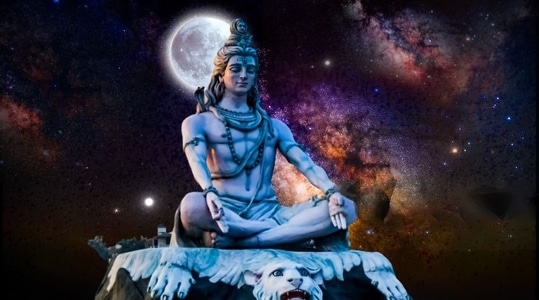
Spirituality
All You Need to Know About Masik (Monthly) Shivratri
Mahashivratri holds a special place in the hearts of devotees for various reasons. Devotees meditate and engage in prayers during this auspicious day and night, seeking the blessings of Lord Shiva for their spiritual well-being, inner peace, and the removal of obstacles.
However, do you know that every month in the Sanatana lunar calendar holds its own Shivratri? Each of them has its unique spiritual importance. These monthly Shivratri days are known as “Masik Shivratri,” and they are celebrated on the Chaturdashi, that is, the 13th or 14th day of each lunar fortnight. While Mahashivratri is the most widely recognized and celebrated, the other monthly Shivratri days also hold spiritual significance.
In this blog, we’ll delve deeper into the realm of Masik Shivratris. As we embark on this journey of discovery, we’ll uncover the profound wisdom behind these monthly Shivratri observances, delve into the rituals that guide them, and unravel the many blessings and benefits they bring.
Ancient text of Skanda Purana has one mantra singing the praises of Masik Shivratri, that goes as follows:
चतुर्द्दशी तथा शंभोः प्रिया नास्त्यत्र संशयः॥निशीथसंयुता या तु कृष्णपक्षे चतुर्द्दशी॥
उपोष्या सा तिथिः श्रेष्ठा शिवसायुज्यकारिणी॥ शिवरात्रितिथिः ख्याता सर्वपापप्रणाशिनी॥
अत्रैवोदाहरंतीममितिहासं पुरातनम्॥
Meaning:
It is undoubtedly the favorite day of Lord Shiv. One should observe fast till the midnight of Chaturdashi Tithi. It is the best way and conducive for the attainment of Sayujya (merging into God’s impersonal effulgence) with Shiva. This holy day, Shivaratri is well known as the destroyer of all sins.
Things you will need for the Masik Shivratri Puja:
Clean Clothes, Ghee (clarified butter), and oil Lamp
Abhisheka Materials like water, ghee, milk, sugar, curd, honey, Gangajal (holy Ganges water) etc.
Offerings like Belpatra (Aegle marmelos leaves), Dhatura (jimson weeds), Quince)
Sacred Texts like Shiva Purana, Shiva Stuti, Shiva Ashtak, Shiva Chalisa, Shiva Shloka etc. for chanting
Other Fruits and Sweets as Prasad and Donation Items.
And remember, even if you don’t have access to all these items, do not worry. Devotion and a sincere heart truly matter in your observance of Masik Shivratri. Lord Shiva, the embodiment of compassion and grace, values the heart’s devotion above all else. Whether you have an elaborate Puja set up with all the traditional items or simply a heartfelt prayer, it is your unwavering love and dedication that the divine truly acknowledges.
Masik Shivratri Rituals:
Fasting during Masik Shivratri holds great spiritual significance. It is believed to purify the mind and body, allowing devotees to draw closer to Lord Shiva and seek His divine blessings. This self-discipline and sacrifice serve as a means to transcend earthly desires and connect with the spiritual essence within.
On the day of the monthly Shivratri, begin your day by waking up before sunrise and taking a purifying bath. Dress in clean attire, symbolizing your purity and devotion.
Light a lamp and make a heartfelt resolution to fast, focusing on your spiritual goals and meditating on your wishes and resolutions for the day.
Worship Lord Shiva and Mother Parvati in a Shiva temple or your home shrine. Include Lord Ganesha in your worship, seeking His blessings.
Prioritize the Shivling in your worship. Perform Abhishekam by pouring water, pure ghee, milk, sugar, honey, Gangajal and curd over the Shivling. Consider performing Rudrabhishek to please Lord Shiva more efficiently. Offer Belpatra, Dhatura, etc., to Lord Shiva.
While worshiping Lord Shiva, recite sacred texts from Shiva Purana, Shiva Stuti, Shiva Ashtak, Shiva Chalisa, and Shiva Shloka, as per the instructions from your Guruji.
During meditation, chant “Om Namah Shivay” to deepen your spiritual connection.
In the evening, you may consume fruits, but it’s important to refrain from consuming a full meal during the Shivratri fast.
On the next day, perform another worship ceremony dedicated to Lord Shiva, and consider donating to the poor or in the temple as a gesture of gratitude and goodwill.
For the most fruitful Shivratri observance, worship Lord Shiva after midnight, as it is believed that the energies are particularly potent during this time.
Benefits of Masik Shivratri Puja Sadhana:
In the sacred observance of Masik Shivratri Vrat, devotees harness the power to overcome the troubling forces of ‘Tamas’ (impure) and ‘Rajas’ (ego) Guna, as depicted in several ancient Sanatana texts called Puranas. Through devoted meditation, they gain mastery over managing negative emotions like jealousy, covetousness, and anger, attaining inner peace and tranquility.
For ardent disciples of Lord Shiva, observing the monthly Shivaratri Puja holds immense significance, often surpassing the auspiciousness of performing the powerful Ashwamedha Yagya.
It is believed that those who sincerely and diligently observe Masik Shivaratri Puja are cleansed of their sins, leading to union with the supreme power. In the divine abode of Lord Shiva, they find eternal happiness, liberated from the endless cycle of birth and death.
Even though plenty of literature is available on spiritual practices, it is highly recommended that one learn these methods under the supervision of a Guru or an expert.
Please subscribe to our mailing list to stay connected and receive spiritual information. In case of any queries, please write to us at info@chamundaswamiji.com. You can check out our YouTube channel, Chamunda Swamiji, where you can learn Tantra, Mantra, Yantra, and Meditation from His Holiness Shri Chamunda Swamiji. If you seek to learn Shakti Kriya, please register with us, and we will get back to you.
Post a Comment
-
Subscribe to Our Blog
-
Categories
-
Popular Articles
- Dead moth in the house. What universe is trying to tell you?
- Spiritual Meaning of Moth
- Vivah Bandhan Curse – What Is It and How to Spiritually Heal It.
- The Dasa Mahavidyas
- What are Beej Mantras?
- Tripura Sundari | The Dasa Mahavidya
- Maa Bhuvaneshwari | The Dasa Mahavidyas
- The Five Shades of Tantra
- Ramakrishna Paramhansa – The Man who almost became a Woman
- Maa Chinnamasta | The Dasa Mahavidyas



